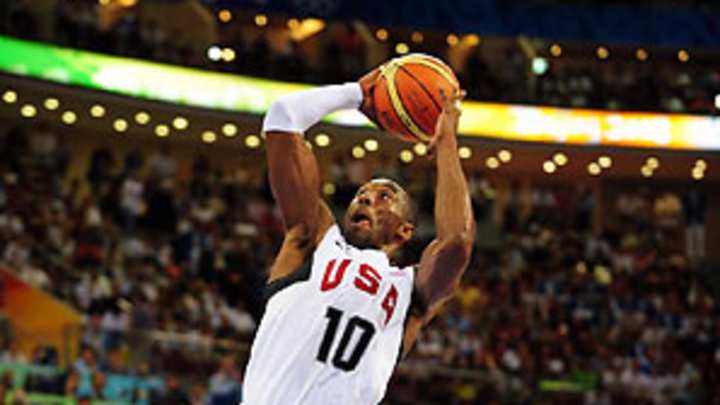The exporting of America's game


BEIJING -- The hoops proselytizer in commissioner David Stern spent years spreading the good word of the NBA, acting globally, but hardly thinking locally.
He never imagined his backyard could be poached from afar. But overseas tycoons -- with the kind of wealth Russian oilmen have used to gobble up art at Christie's of New York, with the kind of strong euro currency foreigners have flashed to land Manhattan's prime real estate -- are looking for new baubles in the United States: like LeBron James and Kobe Bryant.
As the men's Redeem Team barrels toward a gold medal, and as the women's Dream Team continues to dominate the Beijing Games, it's obvious that while the players of the NBA and WNBA are nobly playing for country, they are also auditioning for a world of cash.
James, of LeBron Inc., is openly using the Olympic stage as a catwalk for his global brand, letting it be known to any European suitors that, yes, 'Bron is for sale when he becomes a free agent in 2010. "I like that rumor," he said. Bryant, who owns enough rings to satiate his NBA ambitions, speaks Italian as the second language of his childhood and enjoys the unconditional love of foreign fans undisturbed by his diva ways, is even more likely to jump.
A few giant leaps would devastate the NBA, not in its bottom line, but in its superiority complex. It's hard to proclaim you're No. 1 if top-shelf players migrate across the pond. But this was coming, wasn't it? By globalizing to expand its financial empire, the league unwittingly sabotaged itself by exposing the world to a game it then co-opted for its own.
By assembling Dream Teams as a marketing tool for the past 16 years, the NBA set itself up for the inevitable paradox: Once the Jordan-era awe wore off, international underdogs would eventually start beating the NBA band of one-on-one stars with a thousand backdoor cuts. (See Athens '04.)
Now look who's impressed with whom? "If someone hands $40 million a year to you over there," pondered Dwyane Wade, who also noted the shorter seasons in Europe, "I'm saying it's hard for a guy to turn that down."
Already, nearly a dozen NBA bit players have taken the bait this offseason. Josh Childress bailed on the dysfunctional Hawks, signing with Greece's Olympiakos for a three-year, $32 million deal; and sprite-sized crowd favorite EarlBoykins agreed to a one-year, $3.5 million contract with Virtus Bologna in Italy. Some European players who arrived on the shores of Stern's nirvana are turning around. Dyanmo Moscow plucked former Net Bostjan Nachbar for $14 million over three years, and another Jersey Turnpike refugee, Nenad Krstic, signed a two-year, $18 million deal with Triumph Moscow.
"I don't think we've seen the last of this," Team USA sharpshooter MichaelRedd said. "I'll be honest with you, it's going to be interesting to see what happens in the next three or four years as European teams develop. As you learn from playing in the NBA, business is business."
The women have been hip to this overseas biz for years, often supplementing their $50,000-level WNBA incomes with Euro League money, but even they are being feted with unthinkable new deals. Sue Bird and Diana Taurasi are given the spa treatment -- living a life complete with car service and butler service -- as members of Spartak Moscow. They make more than six times their WNBA salaries as the vanity purchases of a Russian team owner eager to grow the sport in popularity, willing to lose money in that pursuit.
"As an athlete, you want to win," U.S. women's assistant coach DawnStaley said. "You want to win personally and you want to win when you get your check every month. It's a competition and sometimes that means the highest bidder wins. I think if a player chooses to go overseas instead of the NBA -- or, as we've seen with [Brandon Jennings], a high school player goes straight there -- I think it's an awesome thing that you have options. When you don't have options, I think you feel trapped."
This international free trade wasn't part of the NBA plan. The strategy was to eventually establish a franchise in, say, London, where owners would pay an entry fee to the NBA. The Euros are going solo, though. What happened to the NBA being the be-all, end-all? Who would have believed the Dream Team would, over a six-year stretch of underperforming, be one root of the league's lost cachet?
For this reason, the Redeem Team's success this time around is more important than ever to the NBA. So far, it looks back and better than its predecessors against much heartier Olympic competition than the U.S. faced amid the Angola blowouts of the '92 Barcelona Games. A gold medal in Beijing would reverse some of the image erosion, and restore the league's marquee billing. No. 1, once again.
But has the damage already been done? If a player like LeBron or Kobe ends up in Europe, the map of basketball will be re-drawn, with the NBA nudged from the center of the hoops universe. If so, the NBA's global outreach -- which enriched the league with so many Dirk Nowitzkis -- may undermine its home turf should the league lose its best James.
